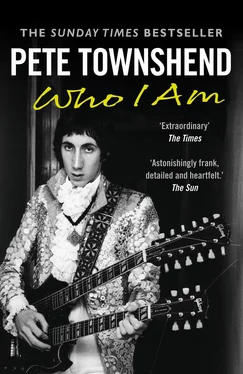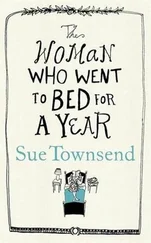When I began at St Saviours at age six I came bottom of the class for reading and writing. By the time I finished I was on the top desk. That, I suppose, was the good part of going to live with Denny. I wrote a letter to Aunt Rose, Denny’s older sister, who returned my letter covered with red spelling and grammatical corrections. I was hurt by this, but Aunt Rose also told Denny that I was too old to be unable to read and write properly, and suggested Denny read me half of a suspenseful book, then stop and give it to me to finish. Denny read me Black Beauty by Anna Sewell, and the ploy worked. Caught up not just in the story but also in the unfamiliar comfort of being read to, I immediately picked up the book and finished it off.
I don’t remember any other books from my time with Denny. One of my few amusements was playing with the knobs on a chest of drawers, pretending they were the controls of a submarine. I also listened to Children’s Hour on the radio; the ‘Toytown’ adventures with Larry the Lamb and Dennis the Dachshund were pretty good.
Opposite our flat was the bus station. Denny would call out the window and invite the drivers to come up for a cup of tea. Sometimes she’d take tea over to them, or send me. Denny saw nothing unusual about going out into the street in her nightdress under a dressing gown, and I didn’t mind crossing the street in my pyjamas to give a cup of tea to a bus driver, but I was upset when she asked me to go further, to the local newsagent or grocer, where I would come upon grown-ups on their way to work, looking at me oddly.
Denny would get me up at five in the morning and she’d pack various items of food prepared the night before, including sponge cakes in baking tins. We’d march to various prearranged assignations, usually with American Air Force officers. There were brief exchanges, Denny passing over a sandwich or a tin, but what she received in return I don’t know. I remember large flashy cars with half-opened windows. I also vaguely remember a man I had to call ‘uncle’, who was deaf in one ear, staying the night a few times. He had a little Hitler moustache.
The whole affair left me angry and resentful. I’ve spent years of psychotherapy trying to understand it. In 1982 my therapist urged me to try to push through to some clearer level of recall by writing about these morning exchanges. I started to write, and as I began describing a meeting – the Air Force officer winding down his window, Denny leaning in – I suddenly remembered for the first time the back door of the car opening. I began to shake uncontrollably and couldn’t write any more, or remember anything else. My memory just shut down.
Our flat opened onto the first-floor landing, and my room was never locked; the key was kept on the outside. When I was afraid at night I’d run to Denny’s room. If her door was unlocked, she shooed me away; if it was locked, she’d feign sleep and wouldn’t respond. To this day I still wake up terrified, sweating with fear, shaking with rage at the fact that my door to the landing was always kept unlocked at night. I was a tiny child, just six years old, and every night I went to sleep feeling incredibly exposed, alone and unprotected.
In addition to the buses, we also had a view of the train station. I loved to look at the magnificent steam engines, fantasising about sharing the moment with a friend, brother, sister – someone. My last thoughts before sleep often focused on longing for physical affection. Denny didn’t touch me apart from slapping me, brutally scrubbing my body in the bath or ducking my head under the water to wash off the soap. One night, when Denny lost her temper, she held my head under for a long time.
At St Saviours there were a few children from the nearby American air base. One tall, lanky boy came to school wearing a jaunty seersucker suit – still de rigueur in certain parts of the USA. His parents were oblivious to any ridicule this might provoke. That is, until Rosie Bradley’s son Robert and I taunted him to the point of tears while his hapless mother walked him home. The fact that I took part in this bullying shames me to this day.
The school’s fat, balding, insincerely jolly headmaster was Mr Matthews. The window in Mr Matthews’s study faced the playground, and his favourite ritual was to cane children at his desk with an audience of jeering children gathered outside. I ended up at his desk one day, I can’t remember what for. I bent over the desk, facing the window full of eager, greedy faces ready to feed on my pain, but to their great disappointment Mr Matthews let me off.
When Mum paid the occasional visit to Denny and me at Westgate, she gave off an aura of London glamour and of being in a hurry, but also of being unreliable. Meanwhile Denny was running after bus drivers and airmen, and I was miserable. I had lost my beautiful young parents to a life of Spartan discipline with a pathetic woman desperately watching her youth slip away. Denny’s feelings for me seemed vengeful, as did Mum’s abandonment. The deaths or disappearances of the beloved men in my life – my absent father and the recently departed George VI – seemed vengeful too. At the age of seven, love and leadership both felt bankrupt.
During this time Mum became romantically involved with another man. I remember sitting in the back seat of a Volkswagen Beetle, waiting at an intersection on Gunnersbury Avenue. Mum is introducing me to the driver, Dennis Bowman; she says he means a great deal to her – in fact, he’s going to be my new father.
‘I like you better than my other dad,’ I say to Mr Bowman. ‘You’ve got a car.’
The car is light green; the traffic lights change to green and I’m giving Mr Bowman the green light.
3 YOU DIDN’T SEE IT
The memory of Mr Bowman came back to me when Mum told me about him years later. Rosie Bradley had kept Mum informed about Denny’s worsening state of mind, and in the end Mum asked Dad to go down there with her. Shocked at Denny’s erratic behaviour, Dad announced: ‘This is ridiculous – he can’t stay with her there – she’s completely round the twist.’ They decided instead that Denny had to come and live with us, until she got better. I sometimes think that if it weren’t for Denny’s obvious madness I might never have returned home from Westgate.
In July 1952 Mum came to collect me from Westgate on the train – not with Dad, but with Dennis Bowman and Jimpy, whom I was delighted to see. On the way back on the train, though, it was clear my mother hadn’t prepared herself for having me back. My fidgeting irritated her, and so did my runny nose. Nothing I did seemed right. Dennis Bowman said quietly to her, ‘That’s a really dear little boy you’ve got there. Why don’t you leave him alone?’
While I’d been away the kids my age in Acton had fallen into two gangs. Jimpy was leader of the larger group, his authority renewed by a weekly running race he always won. On the day I returned, by some miracle I nearly beat him, and was instantly promoted to Jimpy’s second-in-command. After the race I went over to the playground climbing frame, which was occupied by a menacing-looking boy who sneered at me. ‘You’re not getting on here, mate.’
Normally I would have turned tail, but a new courage compelled me to challenge him. I climbed up, and when the boy pushed me I pushed back so hard that he fell. As he dusted off his trousers I could see he was considering teaching me a lesson, but someone whispered in his ear. He skulked away, almost certainly having been told I was a friend of Jimpy. Even then I felt happy and safe in a gang of boys, protected by a dominant male.
Just as my childhood status was improving, the ground under me shifted again. It seemed I was going to lose one of my beloved parents. I didn’t get the details until years later.
Читать дальше












